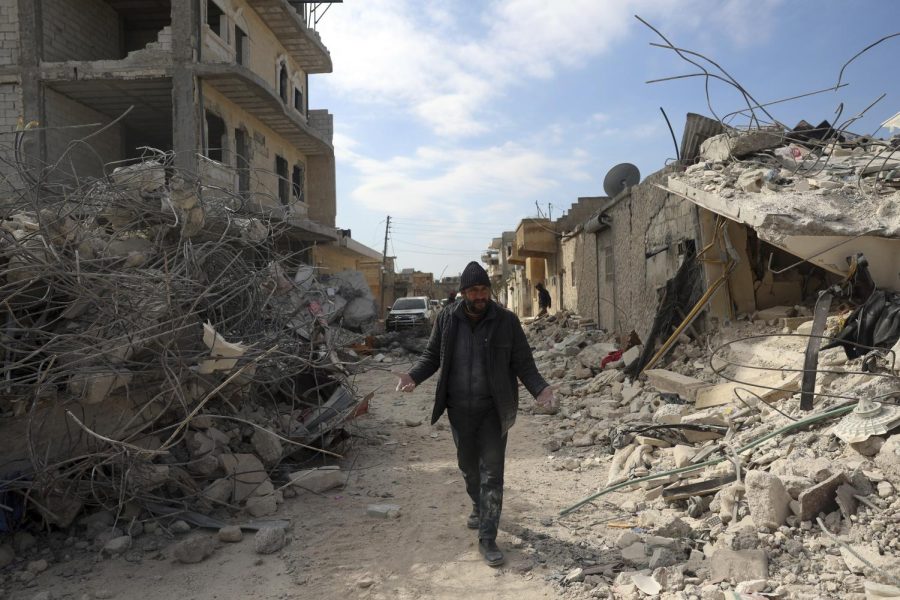Opinion | A ‘respite’ for Syria is not enough, sanctions must end
February 23, 2023
Many countries and activist groups are calling for the U.S. government to lift all sanctions on Syria in the wake of the earthquakes that hit southern Turkey and northern Syria, affecting millions and killing at least 5,800 in Syria and 41,000 in Turkey. On Feb. 10, the U.S. announced that earthquake relief would be “exempted” from the severe sanctioning they have been levying on Syria since 1979.
It’s clear by now that sanctions serve no one but the American state and the military-industrial complex that props it up, allowing it to interfere with economies and deal arms while it starves its own people with impunity. It is imperative to remember, in both the wake of the earthquakes and the decision to “suspend” sanctions, that the U.S.’ relationship with Syria is a fundamentally aggressive one.
The Pentagon has directly funded the conflict in Syria since at least 2014, when they planned, and ultimately failed, to create a slew of militia groups at the scale of the death squads they trained and funded in 1980s Guatemala. The CIA started the “Timber Sycamore” operation to train and arm opposition forces around 2012. Crucially, this was almost immediately after the sanctions on Syria were intensified in a supposed push for “democratic transition” for the benefit of civilians. Obviously, neither operation changed the Syrian government in the slightest, only unleashing a heavier burden of constant violence on civilians.
The actions of the American government as the driving force of the imperial core are often deliberately mystified, if not directly justified. Invasion disguised as intervention, the targeting of infrastructure and the constant worsening of the refugee crisis are cloaked in careful language that makes imperialism seem like an inextricable part of life. This feeling persists not just for its victims, but for the American taxpayers, who fund it at the expense of sorely needed social services. The truth is, there is no complex, nuanced reason that the U.S. behaves this way. There is no noble undercurrent or concern for the lives of those affected by war — it’s all about money and oil, and it always has been.
Independent of the staggering military budget — which Biden increased by $29 billion in 2022 — the US’ involvement in the Syrian conflict can be largely attributed to their financial relationships with Saudi Arabia and Turkey. The U.S.’ shaky alliance with Turkey, where the earthquakes caused more than 41,000 deaths, is in no small part due to the Turkish state’s participation in NATO and its support for the American suppression of leftist movements during the Cold War. The Turkish state has a history of financial involvement in the Syrian civil war since it began and has led a number of military attacks in northern Syria over the last seven years with a particular focus on Kurdish independence movements.
The U.S.’ relationship with Saudi Arabia also has anti-communist origins and currently consists of profiting off of Saudi oil while ignoring the state-sanctioned violence that has become quotidian for Saudi citizens. The Saudi Arabian government is guilty of a multitude of abuses of human rights, including frequent executions, harsh censorship and a covert relationship with Israeli apartheid tactics. Similar to Turkey, Saudi Arabia has financial stakes in the violence in Syria, and, additionally, for the last ten years, Saudi Arabia has been one of the principal arms dealers in the conflict.
None of these facts are being given enough importance in conversations surrounding the U.S.’ potential to aid the victims of the earthquakes. As per usual, one superficial act with no substance beneath it emboldens Americans to lecture about peace and rebuilding while being the primary architects of suffering. Where are the mentions of the diplomatic benefits for US-Saudi relations from American warmongering through economic deprivation? Why are the discussions on the fact that the U.S. controls 90% of Syrian oil? Conflict-related damage to infrastructure was the primary reason for the earthquake death toll in Syria — this should be considered proof enough that the U.S. has done enough damage.
This information is so easily accessible, and these relationships between regimes are so plain to see that it becomes more and more exhausting to see the absolute lack of context applied to disasters such as these. Even if the U.S. didn’t have huge financial stakes in the Syrian civil war, it really doesn’t feel like there’s any excuse for believing that sanctions that target innocent people financially and medically to the point of abject deprivation will ever lead to positive change. It’s high time that the American state faces a modicum of accountability.
Sofia Uriagereka-Herburger writes about politics and international and domestic social movements. Write to her at [email protected].








